Papers
Share
Tweet
Email
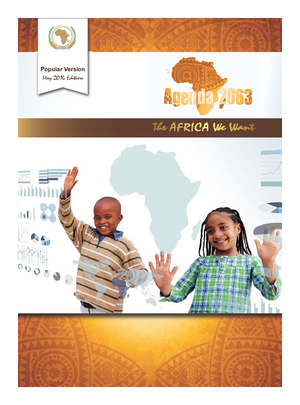
African Union (AU) Agenda 2063 – The Africa we want
This is a strategic framework for the socio-economic transformation of the continent over the next 50 years. Its builds on, and seeks to accelerate the implementation of past and existing continental initiatives for growth and sustainable development.
Some of the past and current initiatives it builds on include: the Lagos Plan of Action, The Abuja Treaty, The Minimum Integration Programme, the Programme for Infrastructural Development in Africa (PIDA), the Comprehensive Africa Agricultural Development Programme (CAADP), The New partnership for Africa’s Development (NEPAD), Regional Plans and Programmes and National Plans. It is also built on national, regional, continental best practices in its formulation.
African Union (AU) Agenda 2063 – The Africa we want
This is a strategic framework for the socio-economic transformation of the continent over the next 50 years. Its builds on, and seeks to accelerate the implementation of past and existing continental initiatives for growth and sustainable development.
Some of the past and current initiatives it builds on include: the Lagos Plan of Action, The Abuja Treaty, The Minimum Integration Programme, the Programme for Infrastructural Development in Africa (PIDA), the Comprehensive Africa Agricultural Development Programme (CAADP), The New partnership for Africa’s Development (NEPAD), Regional Plans and Programmes and National Plans. It is also built on national, regional, continental best practices in its formulation.
African Union (AU) Agenda 2063 – The Africa we want
This is a strategic framework for the socio-economic transformation of the continent over the next 50 years. Its builds on, and seeks to accelerate the implementation of past and existing continental initiatives for growth and sustainable development.
Some of the past and current initiatives it builds on include: the Lagos Plan of Action, The Abuja Treaty, The Minimum Integration Programme, the Programme for Infrastructural Development in Africa (PIDA), the Comprehensive Africa Agricultural Development Programme (CAADP), The New partnership for Africa’s Development (NEPAD), Regional Plans and Programmes and National Plans. It is also built on national, regional, continental best practices in its formulation.
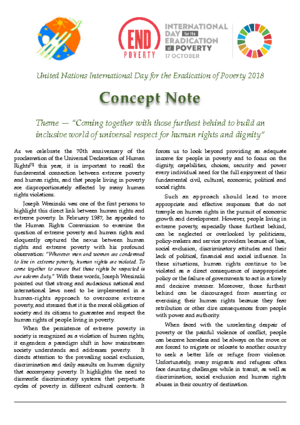
United Nation IDEP 2018
Concept Note
As we celebrate the 70th anniversary of the proclamation of the Universal Declaration of Human Rights this year, it is important to recall the fundamental connection between extreme poverty and human rights, and that people living in poverty are disproportionately affected by many human rights violations. Celebrated since 1987 as the World Day for Overcoming Extreme Poverty and recognized by the United Nations in 1992, the International Day for the Eradication of Poverty promotes dialogue and understanding between people living in poverty and their communities, and society at large. “It represents an opportunity to acknowledge the efforts and struggles of people living in poverty, a chance for them to make their concerns heard and a moment to recognize that poor people are in the forefront in the fight against poverty.
As we celebrate the 70th anniversary of the proclamation of the Universal Declaration of Human Rights this year, it is important to recall the fundamental connection between extreme poverty and human rights, and that people living in poverty are disproportionately affected by many human rights violations. Celebrated since 1987 as the World Day for Overcoming Extreme Poverty and recognized by the United Nations in 1992, the International Day for the Eradication of Poverty promotes dialogue and understanding between people living in poverty and their communities, and society at large. “It represents an opportunity to acknowledge the efforts and struggles of people living in poverty, a chance for them to make their concerns heard and a moment to recognize that poor people are in the forefront in the fight against poverty.
As we celebrate the 70th anniversary of the proclamation of the Universal Declaration of Human Rights this year, it is important to recall the fundamental connection between extreme poverty and human rights, and that people living in poverty are disproportionately affected by many human rights violations. Celebrated since 1987 as the World Day for Overcoming Extreme Poverty and recognized by the United Nations in 1992, the International Day for the Eradication of Poverty promotes dialogue and understanding between people living in poverty and their communities, and society at large. “It represents an opportunity to acknowledge the efforts and struggles of people living in poverty, a chance for them to make their concerns heard and a moment to recognize that poor people are in the forefront in the fight against poverty.
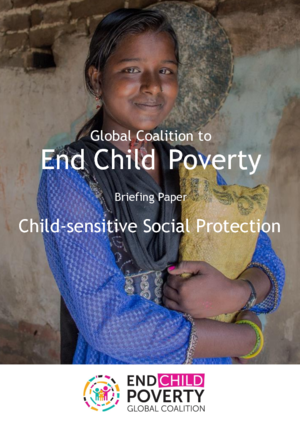
Coalition Child Sensitive Social Protection
Briefing Paper
Social protection is a basic human right for children, enshrined in the Convention on the Rights of the Child (UNCRC Articles 26-27). Based on the Convention, children have the right to social security and an adequate standard of living, both of which can be guaranteed for children and families who live in poverty through publicly-funded social protection. Social protection, overall, is now widely recognized as one of the foremost interventions as part of the policy package for fighting child poverty. Child-sensitive Social Protection (CSSP) is a well-proven approach within social protection to help realize the rights of children. CSSP helps families to cope with chronic poverty, stresses and shocks and enables them to invest on an adequate and continuing basis in their children’s well-being.
Social protection is a basic human right for children, enshrined in the Convention on the Rights of the Child (UNCRC Articles 26-27). Based on the Convention, children have the right to social security and an adequate standard of living, both of which can be guaranteed for children and families who live in poverty through publicly-funded social protection. Social protection, overall, is now widely recognized as one of the foremost interventions as part of the policy package for fighting child poverty. Child-sensitive Social Protection (CSSP) is a well-proven approach within social protection to help realize the rights of children. CSSP helps families to cope with chronic poverty, stresses and shocks and enables them to invest on an adequate and continuing basis in their children’s well-being.
Social protection is a basic human right for children, enshrined in the Convention on the Rights of the Child (UNCRC Articles 26-27). Based on the Convention, children have the right to social security and an adequate standard of living, both of which can be guaranteed for children and families who live in poverty through publicly-funded social protection. Social protection, overall, is now widely recognized as one of the foremost interventions as part of the policy package for fighting child poverty. Child-sensitive Social Protection (CSSP) is a well-proven approach within social protection to help realize the rights of children. CSSP helps families to cope with chronic poverty, stresses and shocks and enables them to invest on an adequate and continuing basis in their children’s well-being.
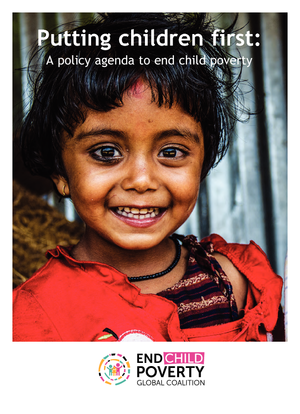
Putting Children First
Briefing Paper
This brand new briefing paper draws on evidence and the experience of over 20 organizations working together in the Global Coalition to End Child Poverty. It outlines key building blocks for how countries can address child poverty and offers evidence and experience to support national discussion on the best policy options for children.
This brand new briefing paper draws on evidence and the experience of over 20 organizations working together in the Global Coalition to End Child Poverty. It outlines key building blocks for how countries can address child poverty and offers evidence and experience to support national discussion on the best policy options for children.
This brand new briefing paper draws on evidence and the experience of over 20 organizations working together in the Global Coalition to End Child Poverty. It outlines key building blocks for how countries can address child poverty and offers evidence and experience to support national discussion on the best policy options for children.
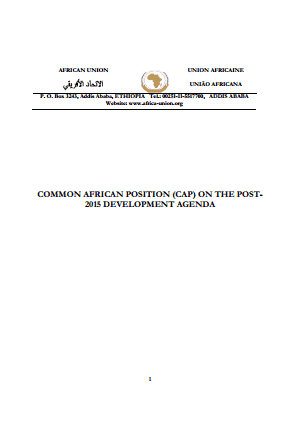
Common African Position (Cap) on the Post 2015 Development Agenda
Recalling the July 2012 Decision of the African Union Summit (Assembly/AU/Dec. 423 (XIX)), which mandates the African Union Commission, in close consultation with Members States and Regional Economic Communities, to identify Africa’s priorities for the post-2015 Development Agenda, and further recalling the Decision of May 2013 of the African Union Summit, which decided to establish a High-Level Committee (HLC) of Heads of State and Government to sensitize and coordinate the activities of African leaders and build regional and inter-continental alliances on the Common African Position (CAP) on the post-2015 Development Agenda (Assembly/AU/Dec.475(XXI)), a ten-member committee was formed.
Common African Position (Cap) on the Post 2015 Development Agenda
Recalling the July 2012 Decision of the African Union Summit (Assembly/AU/Dec. 423 (XIX)), which mandates the African Union Commission, in close consultation with Members States and Regional Economic Communities, to identify Africa’s priorities for the post-2015 Development Agenda, and further recalling the Decision of May 2013 of the African Union Summit, which decided to establish a High-Level Committee (HLC) of Heads of State and Government to sensitize and coordinate the activities of African leaders and build regional and inter-continental alliances on the Common African Position (CAP) on the post-2015 Development Agenda (Assembly/AU/Dec.475(XXI)), a ten-member committee was formed.
Common African Position (Cap) on the Post 2015 Development Agenda
Recalling the July 2012 Decision of the African Union Summit (Assembly/AU/Dec. 423 (XIX)), which mandates the African Union Commission, in close consultation with Members States and Regional Economic Communities, to identify Africa’s priorities for the post-2015 Development Agenda, and further recalling the Decision of May 2013 of the African Union Summit, which decided to establish a High-Level Committee (HLC) of Heads of State and Government to sensitize and coordinate the activities of African leaders and build regional and inter-continental alliances on the Common African Position (CAP) on the post-2015 Development Agenda (Assembly/AU/Dec.475(XXI)), a ten-member committee was formed.


